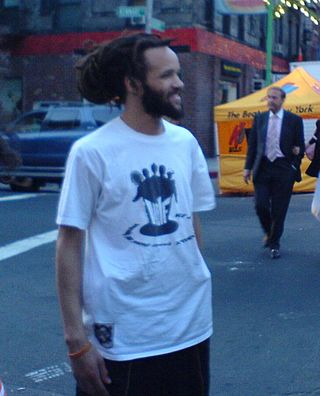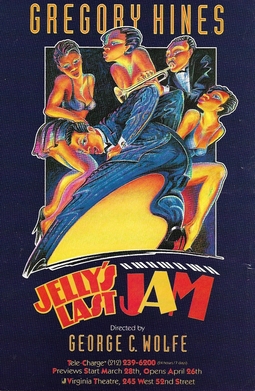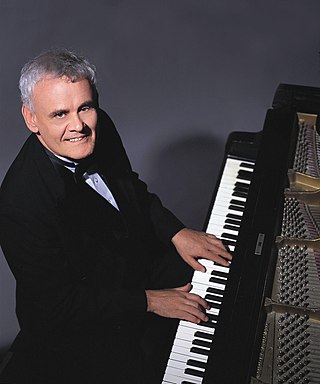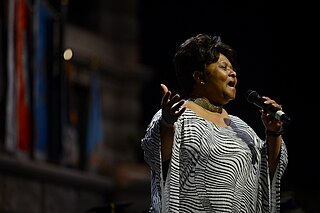
Ferdinand Joseph LaMothe, known professionally as Jelly Roll Morton, was an American ragtime and jazz pianist, bandleader, and composer of Louisiana Creole descent. Morton was jazz's first arranger, proving that a genre rooted in improvisation could retain its essential characteristics when notated. His composition "Jelly Roll Blues", published in 1915, was one of the first published jazz compositions. He also claimed to have invented the genre.

Clarence Williams was an American jazz pianist, composer, promoter, vocalist, theatrical producer, and publisher.
Jazz standards are musical compositions that are an important part of the musical repertoire of jazz musicians, in that they are widely known, performed, and recorded by jazz musicians, and widely known by listeners. There is no definitive list of jazz standards, and the list of songs deemed to be standards changes over time. Songs included in major fake book publications and jazz reference works offer a rough guide to which songs are considered standards.

Savion Glover is an American tap dancer, actor, and choreographer.
Stephen Flaherty is an American composer of musical theatre and film. He works most often in collaboration with the lyricist/book writer Lynn Ahrens. They are best known for writing the Broadway musicals Ragtime, which was nominated for thirteen Tony Awards, two Grammy Awards, and won the Tony for Best Original Score; Once on This Island, which won the Tony Award for Best Revival of a Musical, the Olivier Award for London's Best Musical, and was nominated for a Grammy Award and eight Tony Awards; and Seussical, which was nominated for the Grammy Award. Flaherty was also nominated for two Academy Awards and two Golden Globe Awards for his songs and song score for the animated film musical Anastasia.

Luther Henderson was an American arranger, composer, orchestrator, and pianist best known for his contributions to Broadway musicals.

Morten Gunnar Larsen is a Norwegian jazz pianist and composer, well known for several stride piano recordings and collaborations.

Contact is a musical "dance play" that was developed by Susan Stroman and John Weidman, with its "book" by Weidman and both choreography and direction by Stroman. It ran both off-Broadway and on Broadway in 1999–2002. It consists of three separate one-act dance plays.

George Costello Wolfe is an American playwright and director of theater and film. He won a Tony Award in 1993 for directing Angels in America: Millennium Approaches and another Tony Award in 1996 for his direction of the musical Bring in 'da Noise/Bring in 'da Funk. He served as Artistic Director of The Public Theater from 1993 until 2004.
Alfred "Pepsi" Bethel was a jazz dancer, choreographer, and leader of his own dance troupe, the Pepsi Bethel Authentic Jazz Dance Theater, which he founded in 1960.

Thou Shalt Not is a musical based on Émile Zola's 1867 novel Thérèse Raquin with music and lyrics by Harry Connick Jr. and an adapted book by David Thompson. The musical deals with the consequences involved in the breaking of several Commandments, in particular the sixth and seventh. It ran on Broadway in 2001.

Jelly's Last Jam is a musical with a book by George C. Wolfe, lyrics by Susan Birkenhead, and music by Jelly Roll Morton and Luther Henderson. Based on the life and career of Ferdinand Joseph LaMothe, known as Jelly Roll Morton and generally regarded as one of the primary driving forces behind the introduction of jazz to the American public in the early 20th century, it also serves as a social commentary on the African-American experience during the era. LaMothe was born into a Louisiana Creole family that was established and free before the Civil War.
Gus Giordano, born after August Thomas Giordano III, was an American jazz dancer, teacher, and choreographer. He performed on Broadway, in theater and on television. Giordano taught jazz dance to thousands around the world. He founded the Gus Giordano Dance School in 1953, Gus Giordano Jazz Dance Chicago in 1963, created the First American Jazz Dance World Congress in 1990 and is the author of Anthology of American Jazz Dance (1975). He taught at institutions around the world including American Ballet Theatre, The American University of Paris, Duke University, Joffrey Ballet, and New York University. Giordano was one of the founders of theatrical or Broadway jazz dance styles, not to be confused with African American vernacular jazz styles that he drew upon.
"In the Jailhouse Now" is an American novelty blues song originally found in vaudeville performances from the early 20th century, usually credited to Jimmie Rodgers. The song's first two verses trace the exploits of Ramblin’ Bob, who cheats at cards and gets caught, while the final verse tells about taking a girl named Susie out on the town and winding up in jail together.

Terry Waldo is an American pianist, composer, and historian of early jazz, blues, and stride music, and is best known for his contribution to ragtime and his role in reviving interest in this form, starting in the 1970s. Says Wynton Marsalis in his introduction to Waldo's book: "He teaches Ragtime, he talks about Ragtime, he plays it, he embodies it, he lives it, and he keeps Ragtime alive." The book, This is Ragtime, published in 1976, grew out of the series of the same title that Waldo produced for NPR in 1974. Waldo is also a theatrical music director, producer, vocalist, and teacher. He is noted for his wit and humor in performance, as "a monologist in the dry, Middle Western tradition." Eubie Blake describes his first impression of Waldo's performance thus: "I died laughing...that's one of the hardest things to do—make people laugh. Terry's ability to do this, combined with his musicianship, actually reminds me of Fats Waller."
Eugene Louis Faccuito, known professionally as Luigi, was an American jazz dancer, choreographer, teacher, and innovator who created the jazz exercise technique. The Luigi Warm Up Technique is a training program that promotes body alignment, balance, core strength, and "feeling from the inside." It is also used for rehabilitation. This method became the world's first standard technique for teaching jazz and musical theater dance.
One Mo' Time is a musical revue conceived by Vernel Bagneris. It is an evening of 1920s African-American vaudeville, set in the Lyric Theatre of New Orleans in 1926.

French Quarter is a 1978 American drama film directed by Dennis Kane, and telling two parallel stories set in the red light area of New Orleans, one contemporary and one set at the turn of the century. The film has music composed by Dick Hyman.

Topsy Chapman (1947–2022) was a Jazz and Gospel musician from New Orleans, Louisiana.
New Orleans: the Storyville Musical is a musical by Toni Morrison, Donald McKayle and Dorothea Freitag, set in 1917 in New Orleans' Storyville district. Produced in workshop in 1982, it also received staged readings at New York Shakespeare Festival in 1984 but was never fully produced. It was Morrison's first venture in the medium of theatre.











